七年级英语上册 Module 8 Choosing presents Unit 1 I always like birthday parties教案 (新版)外研版
外研版七年级上册Module 8 Choosing presents Unit 1
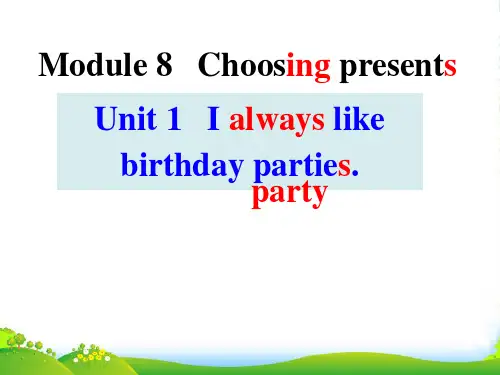
eggs × ×
●When it is my birthday,
1. I always get a cake from my mother. 2.I usually get presents from my friends. 3.I often have a party at home 4.My friends never make a cake for me.
would like意为“想,想要”,与want 意义相同,但语气更委婉。would like可与 任何人称连用,没有人称和数的变化,肯 定句中would常在主语后面缩写为’d。
肯定句:主语 + would like … 一般疑问句:Would + 主语 + like …? 特殊疑问句:疑问词 + would + 主语 + like …?
√
√
Sunday
√
×
Adverb of frequence always usually
Sam
√ √ √ × √ √ ×
often
Betty
× × × × × × ×
never
fill the table with always, usually, often or never.
Jim
1.Jim _a_l_w__a_y_sgoes day
cake
balloons
hats
[bə'lu:n]
flowers
present s
candy candles
card
What other words do you know about
birthday? beer dance sing friends
2019年外研版七年级上册英语教案:Module8ChoosingPresents
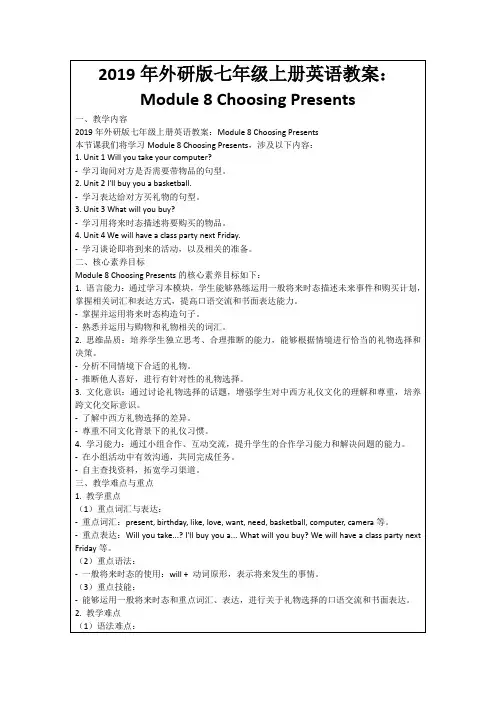
(五)总结回顾(用时5分钟)
今天的学习,我们了解了如何使用一般将来时态来讨论购买礼物的计划,以及如何根据他人的喜好选择合适的礼物。同时,我们也通过实践活动和小组讨论加深了对这个话题的理解。我希望大家能够掌握这些知识点,并在日常生活中灵活运用。最后,如果有任何疑问或不明白的地方,请随时向我提问。
(二)新课讲授(用时10分钟)
1.理论介绍:首先,我们要了解一般将来时态的基本概念。一般将来时态是用来描述将要发生的事情,它由will加动词原形构成,是英语中表达未来计划或预测的重要时态。
2.案例分析:接下来,我们来看一个具体的案例。这个案例展示了如何使用一般将来时态来讨论购买礼物的计划,以及如何根据他人的喜好做出选择。
五、教学反思
在今天的教学中,我发现学生们对于Module 8 Choosing Presents的内容表现出了浓厚的兴趣。他们积极参与讨论,对于如何使用一般将来时态和礼物相关的词汇进行交流显得十分兴奋。然而,我也注意到在实践活动中,部分学生在构造将来时态的句子时还存在一些困难,这提示我在未来的教学中需要更加注重语法点的讲解和练习。
在难点的处理上,我尝试通过举例和对比来帮助学生理解,但效果似乎并不如预期。我意识到,我需要寻找更多元化的教学方法,比如使用图表、动画或者实物展示,来帮助学生更好地突破学习难点。
最后,今天的课堂总结环节,学生们的反馈让我感到他们对这节课的内容有了扎实的掌握。不过,我也意识到在课后需要提供更多的复习材料和练习,以便学生们能够在家中继续巩固所学知识。
-学习询问对方是否需要带物品的句型。
2. Unit 2 I'll buy you a basketball.
外研版七年级英语上册《Module 8,Choosing presents Unit 1》教学设计

外研版七年级英语上册《Module 8,Choosing presents Unit 1》教学设计一. 教材分析《Module 8, Choosing presents Unit 1》是人教版初中英语七年级上册的一篇课文。
本课主要讲述在选择礼物时,要考虑对方的喜好和需要。
教材内容贴近学生的生活实际,有利于激发学生的学习兴趣。
通过本课的学习,学生能够掌握相关词汇和句型,运用所学知识进行日常交流。
二. 学情分析七年级的学生具备一定的英语基础,对日常生活话题感兴趣。
但部分学生可能在词汇量和语法知识方面有所欠缺,需要教师在教学中给予关注和引导。
三. 教学目标1.知识目标:学生能够掌握本课中的词汇和句型,正确运用它们进行交流。
2.能力目标:学生能够听懂、说清、读懂有关选择礼物的对话,提高口语表达能力和阅读理解能力。
3.情感目标:学生能够学会在选择礼物时考虑对方的喜好和需要,培养关爱他人的意识。
四. 教学重难点1.重点:词汇和句型的学习,以及运用它们进行日常交流。
2.难点:正确运用情态动词和一般现在时进行表达。
五. 教学方法1.情境教学法:通过设定情境,让学生在实际语境中学习词汇和句型。
2.任务型教学法:通过完成任务,激发学生的学习兴趣,提高口语表达能力。
3.小组合作学习:培养学生团队合作精神,提高课堂参与度。
六. 教学准备1.教材、录音机、投影仪等教学设备。
2.与本课内容相关的图片、卡片等教学辅助材料。
3.事先学生进行小组合作学习,准备相关任务。
七. 教学过程1.导入(5分钟)利用图片或实物引入主题,激发学生的兴趣。
例如,展示一些礼物图片,让学生猜测对方喜欢什么样的礼物。
2.呈现(10分钟)教师播放课文录音,让学生跟读。
然后展示课文内容,引导学生关注关键词和句型。
3.操练(10分钟)学生分角色朗读课文,模仿语音语调。
教师选取几个学生进行角色扮演,其他学生观看并给予评价。
4.巩固(10分钟)学生进行小组合作学习,完成相关任务。
外研版七年级英语上册《Module 8,Choosing presents Unit 3》教学设计
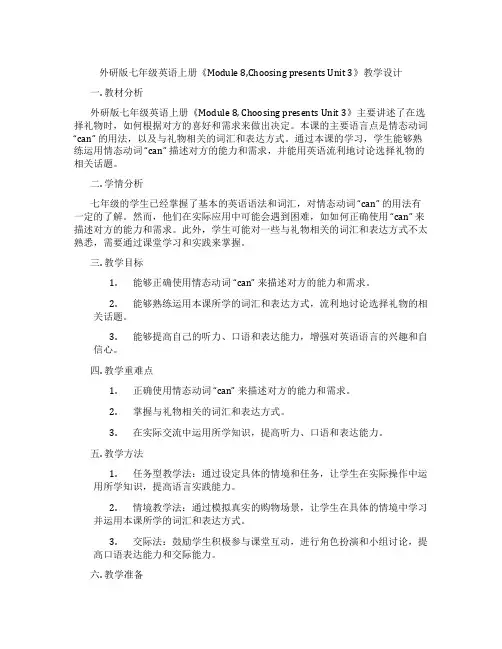
外研版七年级英语上册《Module 8,Choosing presents Unit 3》教学设计一. 教材分析外研版七年级英语上册《Module 8, Choosing presents Unit 3》主要讲述了在选择礼物时,如何根据对方的喜好和需求来做出决定。
本课的主要语言点是情态动词“can” 的用法,以及与礼物相关的词汇和表达方式。
通过本课的学习,学生能够熟练运用情态动词“can” 描述对方的能力和需求,并能用英语流利地讨论选择礼物的相关话题。
二. 学情分析七年级的学生已经掌握了基本的英语语法和词汇,对情态动词“can” 的用法有一定的了解。
然而,他们在实际应用中可能会遇到困难,如如何正确使用“can” 来描述对方的能力和需求。
此外,学生可能对一些与礼物相关的词汇和表达方式不太熟悉,需要通过课堂学习和实践来掌握。
三. 教学目标1.能够正确使用情态动词“can” 来描述对方的能力和需求。
2.能够熟练运用本课所学的词汇和表达方式,流利地讨论选择礼物的相关话题。
3.能够提高自己的听力、口语和表达能力,增强对英语语言的兴趣和自信心。
四. 教学重难点1.正确使用情态动词“can” 来描述对方的能力和需求。
2.掌握与礼物相关的词汇和表达方式。
3.在实际交流中运用所学知识,提高听力、口语和表达能力。
五. 教学方法1.任务型教学法:通过设定具体的情境和任务,让学生在实际操作中运用所学知识,提高语言实践能力。
2.情境教学法:通过模拟真实的购物场景,让学生在具体的情境中学习并运用本课所学的词汇和表达方式。
3.交际法:鼓励学生积极参与课堂互动,进行角色扮演和小组讨论,提高口语表达能力和交际能力。
六. 教学准备1.教学课件:制作与本课内容相关的课件,包括图片、视频和练习题等。
2.教学材料:准备与礼物相关的实物物品,如玩具、书籍等,用于展示和练习。
3.录音设备:用于播放听力材料。
七. 教学过程1.导入(5分钟)通过播放一段关于购物的视频,引导学生思考他们在购物时会考虑的因素。
外研版七年级上册 Module 8 Choosing presents Unit 1 I alway
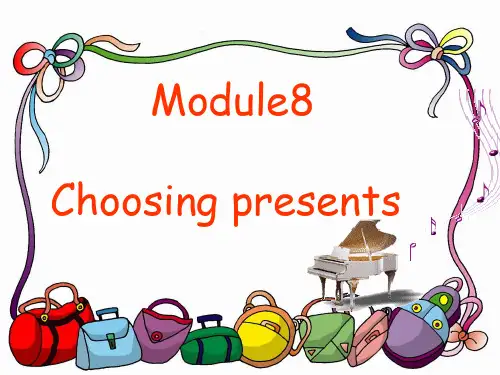
× 3. Daming anlewvaeyrs has birthday presents.
Everyday English
● Would you like to come to my birthday party?
● It’s a secret.
I love you
mum
Different countries have different ways to celebrate birthday 不同国家不同的生日庆祝方式
What do you never do on your birthday?
What do you never do on your birthday?
I never cry on my birthday.
cry
drink
Talk: work in pairs.
100% 80% 60% 40%
I always get a present.
What do you often do on your birthday?
I often have a birthday party.
What do you often do on your birthday?
make a wish blow the candles make a cake
3. Know how to celebrate a birthday.
Words and expressions
card n. 卡片 party n. 晚会;聚会 present n. 礼物 would v.aux. 肯;会;愿意 always adv. 总是;一直 great adj. 太好了;巨大的 cake n. 蛋糕
Module8+++Choosing++presents单词过关练-外研版英语七年级上册
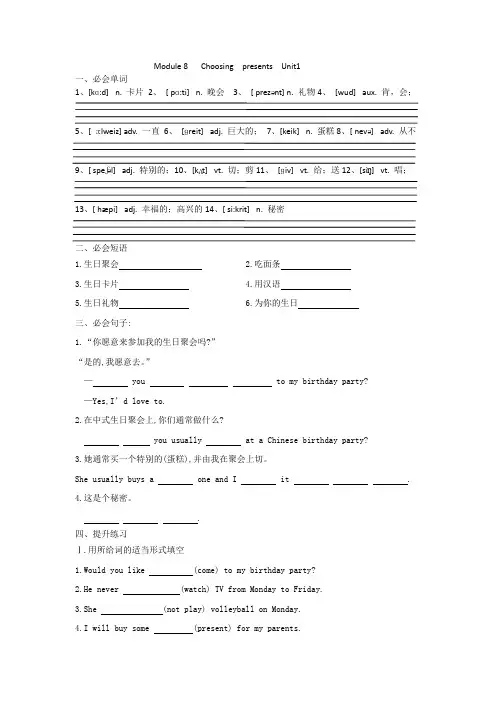
Module 8 Choosing presents Unit1一、必会单词1、[kɑ:d] n. 卡片2、[ pɑ:ti] n. 晚会3、[ prezənt] n. 礼物4、[wud] aux. 肯,会;5、[ ɔ:lweiz] adv. 一直6、[ɡreit] adj. 巨大的;7、[keik] n. 蛋糕8、[ nevə] adv. 从不9、[ speʃəl] adj. 特别的;10、[kʌt] vt. 切;剪11、[ɡiv] vt. 给;送12、[siŋ] vt. 唱;13、[ hæpi] adj. 幸福的;高兴的14、[ si:krit] n. 秘密二、必会短语1.生日聚会2.吃面条3.生日卡片4.用汉语5.生日礼物6.为你的生日三、必会句子:1.“你愿意来参加我的生日聚会吗?”“是的,我愿意去。
”— you to my birthday party?—Yes,I’d love to.2.在中式生日聚会上,你们通常做什么?you usually at a Chinese birthday party?3.她通常买一个特别的(蛋糕),并由我在聚会上切。
She usually buys a one and I it .4.这是个秘密。
.四、提升练习Ⅰ.用所给词的适当形式填空1.Would you like (come) to my birthday party?2.He never (watch) TV from Monday to Friday.3.She (not play) volleyball on Monday.4.I will buy some (present) for my parents.5.Linda often (get) some flowers on Teachers’ Day.6.Lingling her mother at home.(often)(help)7.Jack up late in the morning.(never)(get)8.Sandy to school at seven in the morning.(always)(go)9.My uncle football matches on TV at home.(usually)(watch) Ⅱ.根据汉语意思完成句子6.她从来不玩电脑游戏。
外研社七年级上英语英语《Module 8,Choosing presents》教学设计
外研社七年级上英语英语《Module 8,Choosing presents》教学设计一. 教材分析外研社七年级上英语《Module 8, Choosing presents》主要讲述了在购物时如何根据预算和收礼人的喜好选择合适的礼物。
本节课通过介绍不同类型的礼物和购物场所,帮助学生掌握相关词汇和表达方式,提高他们在实际场景中的交际能力。
教材包括三个听力练习、两个阅读练习和一个写作任务,内容丰富,贴近学生生活。
二. 学情分析七年级学生已具有一定的英语基础,但口语表达和听力能力仍有待提高。
他们在购物场景中可能会遇到一些困难,如不了解商品价格、不熟悉购物场所等。
因此,在教学过程中,需要关注学生的实际需求,引导他们积极参与课堂活动,提高他们的交际能力。
三. 教学目标1.知识目标:学生能够掌握本节课的核心词汇和表达方式,如“budget”、“clothing store”等。
2.能力目标:学生能够在购物场景中运用所学知识进行简单交流,提高实际操作能力。
3.情感目标:学生能够体会购物乐趣,树立合理消费观念。
四. 教学重难点1.重点:本节课的核心词汇和表达方式。
2.难点:如何在实际购物场景中运用所学知识进行交流。
五. 教学方法1.任务型教学法:通过设置具体的购物任务,引导学生参与课堂活动,提高他们的实践能力。
2.交际型教学法:鼓励学生进行分组讨论,模拟购物场景,培养他们的交际能力。
3.情境教学法:创设购物场景,帮助学生理解并运用所学知识。
六. 教学准备1.教学材料:教材、多媒体课件、购物场景道具等。
2.教学设备:投影仪、计算机、录音机等。
七. 教学过程1.导入(5分钟)利用图片或实物展示购物场景,引导学生谈论购物话题,激发学生兴趣。
2.呈现(10分钟)展示本节课的核心词汇和表达方式,如“budget”、“clothing store”等,并通过例句解释其含义。
3.操练(15分钟)学生分组进行角色扮演,模拟购物场景,运用所学知识进行交流。
外研社七年级上英语英语《Module8,Choosingpresents》说课稿
外研社七年级上英语英语《Module 8,Choosing presents》说课稿一. 教材分析外研社七年级上英语《Module 8, Choosing presents》是本模块的第一单元,主题是“选择礼物”。
本课的内容包括如何根据场合和人物选择合适的礼物。
教材通过丰富的情景对话和练习,帮助学生掌握相关词汇和表达方式,提高他们的口语交际能力。
二. 学情分析七年级的学生已经掌握了一些基本的英语语法和词汇,具备一定的口语交际能力。
但他们在实际运用中,尤其在选择礼物这一方面,可能还缺乏相关的文化和语境意识。
因此,在教学过程中,我将会注重培养学生的文化素养和语境意识,提高他们的实际应用能力。
三. 说教学目标1.知识目标:学生能够掌握本课中的相关词汇和表达方式,理解如何根据场合和人物选择礼物。
2.能力目标:学生能够在实际情境中运用所学知识,提高他们的口语交际能力。
3.情感目标:学生能够了解西方的送礼习惯,培养他们的跨文化交际意识。
四. 说教学重难点1.重点:学生能够掌握本课中的相关词汇和表达方式,理解如何根据场合和人物选择礼物。
2.难点:学生能够在实际情境中灵活运用所学知识,提高他们的口语交际能力。
五. 说教学方法与手段1.交际法:通过情景对话,让学生在实际语境中学习并运用所学知识。
2.任务型教学法:通过完成各种任务,激发学生的学习兴趣,提高他们的实践能力。
3.信息技术辅助教学:利用多媒体课件和网络资源,丰富教学手段,提高教学效果。
六. 说教学过程1.导入:通过提问学生喜欢的礼物和送礼物的经历,激发学生的学习兴趣,引入本课主题。
2.新课呈现:通过情景对话,让学生了解如何根据场合和人物选择礼物。
3.操练环节:学生分角色扮演,模仿对话,巩固所学知识。
4.任务型活动:学生分组讨论,根据不同的场合和人物,设计合适的礼物方案。
5.输出环节:学生展示自己的礼物方案,大家共同评价,提高口语交际能力。
6.总结:对本课内容进行总结,强调如何根据场合和人物选择礼物。
初中英语七年级上册 Module 8
Module 8 Choosing presentsUnit 1I always like birthday parties.Language Point1、Hi, would you like to come to birthday party ?Would you like to do sth?意为“你愿意做某事吗?”,常用于有礼貌地向别人提出邀请或建议。
肯定回答一般为:" Yes,I'd love / like to......."否定回答一般为:"I'd love / like to ,but I ....."例句:----Would you like to play basketball with me ?----Yes , I'd like / love to .你愿意和我一起打篮球吗?是的,我愿意。
----Would you like to go shopping with me ?----I'd like to ,but I have to finish my homework first .你愿意和我一起去购物吗?我愿意,但我必须先完成作业。
拓展:Would like意为“想,想要”,其用法如下:1、Would like sth. 表示“想要某物”。
I would like a bike.2、Would like to do sth . 意为“想做某事”I would like to buy a book .3、Would like sb to do sth. 意为“想要某人做某事”I would like you to visit the park with us .2、I always like birthday parties . 我总是喜欢生日聚会。
always 意为“总是,一直”,其反义词为never (从不)always 总是位于行为动词之前,be动词或情态动词之后。
外研版七年级上册英语Module 8:Choosing presents单元(模块)整体教学设计
外研版七年级上册英语Module 8:Choosing presents单元(模块)整体教学设计一. 教材分析外研版七年级上册英语Module 8: Choosing presents单元主要围绕购买礼物这一主题展开。
通过本单元的学习,学生能够掌握与购物相关的词汇和表达方式,学会如何根据场合和人物选择合适的礼物。
教材通过听力、口语、阅读和写作等多种形式,让学生在实际语境中运用所学知识,提高他们的语言运用能力。
二. 学情分析七年级的学生已经掌握了基本的英语语法和词汇,具备一定的听说读写能力。
但他们在实际运用英语进行交流时,还存在着一定的困难。
因此,在教学过程中,教师需要关注学生的个体差异,充分调动他们的学习积极性,引导他们主动参与课堂活动。
三. 教学目标1.知识目标:学生能够掌握与购物相关的词汇和表达方式,了解如何根据场合和人物选择合适的礼物。
2.能力目标:学生能够在实际语境中运用所学知识,提高他们的语言运用能力。
3.情感目标:培养学生关心他人,懂得礼尚往来的良好品质。
四. 教学重难点1.重点:购物相关词汇的掌握和实际运用。
2.难点:如何根据场合和人物选择合适的礼物,以及相关表达方式的运用。
五. 教学方法1.任务型教学法:通过设定各种真实的购物场景,让学生在完成任务的过程中,自然地学习和运用所学知识。
2.情境教学法:创设各种购物情境,让学生在实际语境中提高语言运用能力。
3.交际法:鼓励学生积极参与课堂交流,培养他们的交际能力。
六. 教学准备1.教学课件:制作与购物相关的课件,包括图片、视频等。
2.教学材料:准备一些购物场景的卡片,用于操练和巩固。
3.听力材料:下载一些与购物相关的听力材料,用于听力训练。
七. 教学过程1.导入(5分钟)利用课件展示一些购物场景的图片,引导学生谈论他们最喜欢的礼物和购物经历。
2.呈现(10分钟)介绍本课的主要内容,展示购物相关的词汇和表达方式,如“birthday present”、“Christmas present”等。
- 1、下载文档前请自行甄别文档内容的完整性,平台不提供额外的编辑、内容补充、找答案等附加服务。
- 2、"仅部分预览"的文档,不可在线预览部分如存在完整性等问题,可反馈申请退款(可完整预览的文档不适用该条件!)。
- 3、如文档侵犯您的权益,请联系客服反馈,我们会尽快为您处理(人工客服工作时间:9:00-18:30)。
Module 8 Choosing presents一、教学目标1.单词和短语:card, party, present, would, always, great, cake, never, special, eat, give, sing, happy, secret, CD, cinema, concert, magazine, scarf, silk, shirt, T-shirt, choose, exercise, wear, expensive, clothes, shoes, spend, money, film, song, match, weekend, at weekends, dear, hear, hear from, afraid2.交际用语:1)—Would you like to come to my birthday party?—Yes, I’d like to. When is it?2) Great!3) It’s a secret.3.重点句子:1) Daming always gets birthday presents!2) She often goes to the cinema.3) What do you usually do at a Chinese birthday party?4) We sometimes give birthday cards.5) My mother never makes a birthday cake.二、重点及难点:1.频度副词的使用及在句中的位置。
2.动词第三人称单数形式。
I always like birthday parties.三、教学设计:Unit 1 I always like birthday parties.ⅠTeaching modelListening and speakingⅡTeaching methodInteractive approachⅢTeaching aims1. To get to know the adverbs of frequency.2. To understand conversations involving “Daming’s birthday”.3. To be able to pronounce the third person singular endings4. To be able to describe what people do on their birthdayⅣTeaching ObjectivesKey vocabulary: card, party, present, would, always, great, cake, never, special, eat, give, sing, happy, secretKey structures: 1) Would you like to come to my birthday party?2) I always like birthday parties.3) What do you usually do at a Chinese birthday party?4) My mother never makes a birthday cake.5) We sometimes give birthday cards.ⅤTeaching aidsTape recorder, OHP, video, handoutⅥTeaching StepsStep 1 Warming-up1. Show some pictures of birthday and say what they are.Key words:birthday , birthday card , birthday party , birthday cake , birthday presents , havea party , make a cake , eat noodles, eat birthday cake, sing Hap py Birthday song…2. Match the words with the pictures.3. Read the words after the teacher.4. Introduce the new words.5. Enjoy a song: Happy birthday.Step 2 Listening practice.1. Make sure the students understand the symbols they must use to complete the chart2. Play the recording through once while they just listen.3. Ask the students to listen to the recording.4. Play the recording again, then they can check their answer with a partner.5. Call back the answer from the whole class and check the answer.Step 3 Work in pairs.Say what you always / usually / often / never do on your birthday.1. Read through the verbs and have the students repeat them. Make sure they understand them.2. Ask the students to think about what they do, and make a list using the adverbs of frequency individually.3. Pair them to talk about what they do.4. Call back the answer from the whole class and check the answer.Step 4 Listen and read.1. Ask the students to read the conversation silently.2. Play the recording and ask the students to listen and read the conversation.3. Read the conversation.4. Act it out.Step 5 Check (√) the true sentences.1. Ask the students to read through the sentences and have the students follow and /or repeat.2. Play the recording again, then they can check their answer with a partner.3. Call back the answer from the whole class and check the answer.Keys:1. √2. ×3. ×4. √5. ×4. Correct the false sentences.5. Call back the answer from the whole class and check the answer.Step 6 Underline the correct words.1. Ask the students to read through the passage.2. Underline the correct words.3. Call back the answer from the whole class and check the answer.Keys: 1. special 2. cut 3. presentsStep 7 Complete the sentences with the words from the box.1. Ask the students to read through the sentences.2. Complete the sentences with the words from the box with a partner.3. Call back the answer from the whole class and check the answer.Keys: 1. always 2. usually 3. never 4. sometimesStep 8 Listen and repeat.1. Play the recording once without stopping.2. Ask the whole class to repeat.3. Ask the students to practice the sounds in pairs.Step 9 Work in pairs.Ask and answer like this:—What do you often / usually / always /… do on you r birthday?—I often / usually / always /… on my birthday.—What do you often / usually / always /… do on Teachers’ Day?—I often / usually / always /… on Teachers’ Day.Step 10 Grammar1. 动词第三人称单数词尾变化有三种形式。
(1)一般动词在词尾加-s,-s在清辅音后读/s/,在浊辅音或元音后读/z/,ds读/dz/,ts读/ts/。
如:help→helps,know→knows,get→gets,read→reads(2)以字母s,x,ch,sh或有些以o结尾的动词加-es,-es读/iz/。
如:guess→guesses,fix→fixes,teach→teaches,wash→washesgo→goes,do→does(3)以辅音字母+y结尾的动词,先变y为i,再加-es,-ies读/iz/。
